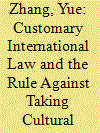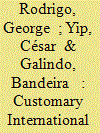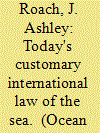| Srl | Item |
| 1 |
ID:
170433


|
|
|
|
|
| Summary/Abstract |
Many countries seek to regain lost cultural property that was taken as spoils of war during the nineteenth and early twentieth centuries. Some scholars, however, regard such claims as baseless in public international law of this period. This article carries out an intertemporal law analysis and argues that the rule against such plunder was indeed founded in the laws and customs of war in the eighteenth century, became well established in the nineteenth century, and further developed in the twentieth century. If the plundered works exist and are identifiable, restitution is the only remedy for violation of this rule. This article aims to provide the legal grounds for restitution claims and thus provide the first steps for victim States to regain their lost cultural property.
|
|
|
|
|
|
|
|
|
|
|
|
|
|
|
|
| 2 |
ID:
155107


|
|
|
|
|
| Summary/Abstract |
The article examines the recent debate between the experts of the Asian-African Legal Consultative Organization and the International Law Commission on the identification of Customary International Law in light of the marginal role that the Third World has played in customary law-making. During the decolonization period, recently independent states and their scholars were quite resistant towards customary law. This cautious stance is justified by the central role of power in the formation of customary rules. Though the doctrine of sources underwent significant reforms during this chapter, recent developments such as the acceleration of custom, the greater role of international organizations and the persistent objector doctrine have not been able to alter this undemocratic bias. Therefore, one should be aware of these limitations when engaging CIL from a Third World perspective.
|
|
|
|
|
|
|
|
|
|
|
|
|
|
|
|
| 3 |
ID:
139524


|
|
|
|
|
| Summary/Abstract |
Customary international law (CIL) is a fundamental source of international law. But scholars lack a clear understanding of customary international law, as well as systematic statistical analyses of its workings. Existing theories posit that CIL is a cooperative equilibrium that can be sustained through reciprocity. Yet, CIL lacks institutional features that facilitate reciprocity and is commonly understood to apply universally, even to states that defect or reject a norm. Because the continued existence of CIL depends on state practice, the potential precedential effect of defection encourages cooperation as long as states value the cooperative norm. Consequentially, a state's decision to apply a CIL norm should be a function of the extent to which the norm is practiced in the community of states it interacts with rather than the past behavior of the specific state in an interaction. We test the implications with newly-collected data documenting if and when 121 states switched from absolute to restrictive foreign state immunity. We find no evidence of direct reciprocity. States that most valued absolute immunity and whose defection would most affect others were least likely to defect, but states became more likely to defect as the states whose practice most affected them defected.
|
|
|
|
|
|
|
|
|
|
|
|
|
|
|
|
| 4 |
ID:
163090


|
|
|
|
|
| Summary/Abstract |
Since 2003, the Proliferation Security Initiative (PSI) has grown from a small collection of like-minded states into a widely accepted, and increasingly institutionalized, counterproliferation effort. However, while the PSI has evolved, the literature around it has stagnated—and disserves ongoing debate by adopting a framework that is both ahistorical and binary. Building on the author’s 2007 paper, this article assesses the past 15 years’ critiques, and argues that the PSI paradoxically reinforces our prevailingly mare liberum regime at the same time that it challenges established navigational freedoms such as the right of innocent passage.
|
|
|
|
|
|
|
|
|
|
|
|
|
|
|
|
| 5 |
ID:
133952


|
|
|
|
|
| Publication |
2014.
|
| Summary/Abstract |
International courts and tribunals, governments, and scholars over the past half-century (many in the past two decades) have identified various provisions of the 1958 and 1982 treaties on the law of the sea that are customary international law and thus binding on all states, including those not party to these treaties. This article systematically collects these opinions and identifies provisions that have not yet attracted their attention
|
|
|
|
|
|
|
|
|
|
|
|
|
|
|
|